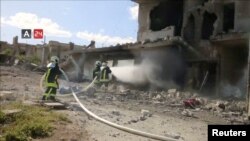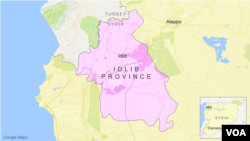A senior United Nations official warns the alarming escalation of hostilities in northern Syria’s Idlib province could spiral out of control with disastrous consequences for its three million civilian inhabitants.
The recent uptick in violence in Syria’s northern Idlib province is causing alarm among U.N. and international observers. Over the past two weeks, at least 100 civilians reportedly have been killed or injured in clashes between Russian-backed Syrian forces and al-Qaida associated rebels.
Dozens of medical and health facilities, as well as schools have been hit by airstrikes and more than 180,000 people reportedly have fled their homes toward supposedly safer areas.
But, U.N. Senior Humanitarian Adviser, Najat Rochdi, notes there are no safe areas in Idlib. She says nearly three million people in the Syrian province are essentially trapped. She says there are no escape routes out of this conflict-ridden area.
“The recent loss of life and suffering of civilians in Idlib is absolutely not acceptable," she said. "People fleeing because of fear and because of bombing is their cruel daily reality. But now if the bombing is continuing where do you want them to flee? They already fled there as like the last resort for them to find a safe place. Where is it that they will be able to go as of now, if this is not stopping?”
Rochdi says she cannot predict whether the current upsurge of violence in Idlib will turn into a full blown or bloody war. But she says the United Nations is preparing for, what she calls, the worst-case scenario.
“It will be a real disaster, and I mean a real tragedy if this is really scaling up more than it is now, not only in terms of impact on the civilians, which is already dramatic in itself, but really in terms of the whole dynamic in the sub-region,” she said.
Rochdi says the Humanitarian Task Force, which is responsible for getting aid into besieged and hard-to-reach areas of Syria, is calling for an urgent de-escalation of the situation. She says the parties to the conflict must recommit fully to the cease-fire arrangement of the memorandum signed last September.
She calls upon the so-called Astana guarantors, especially Russia and Turkey, to uphold the de-escalation agreement to stop all violence and to prevent further escalation. She urges the United States to lend its weight to this process.







